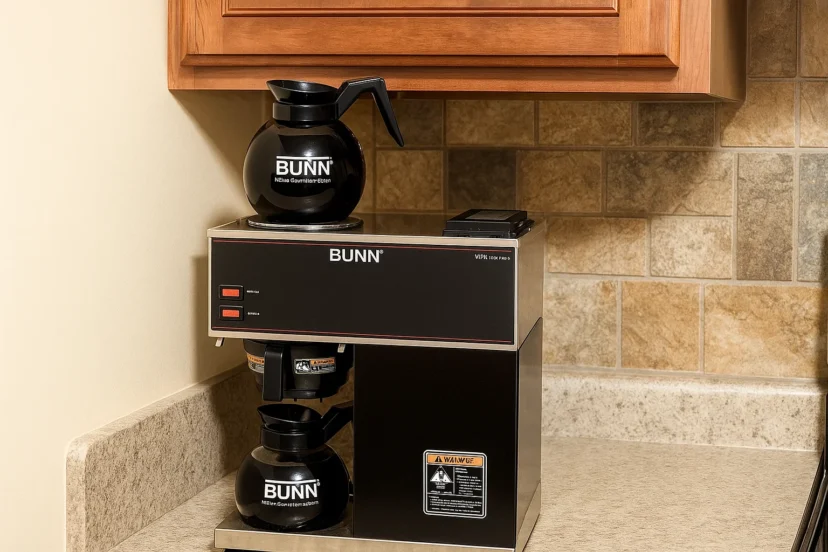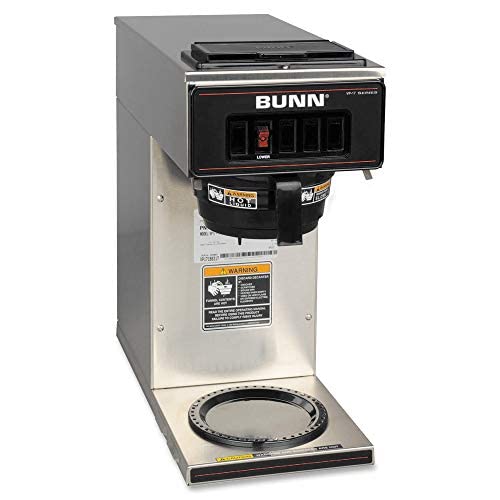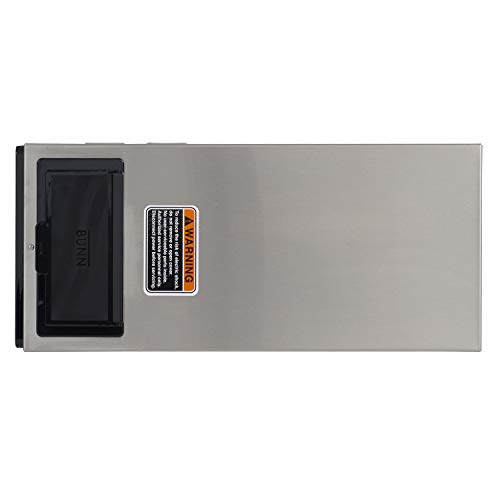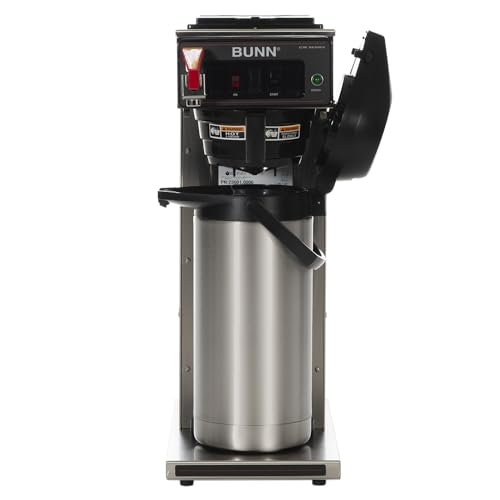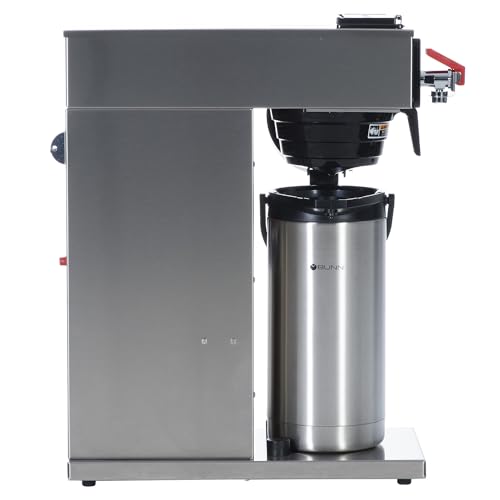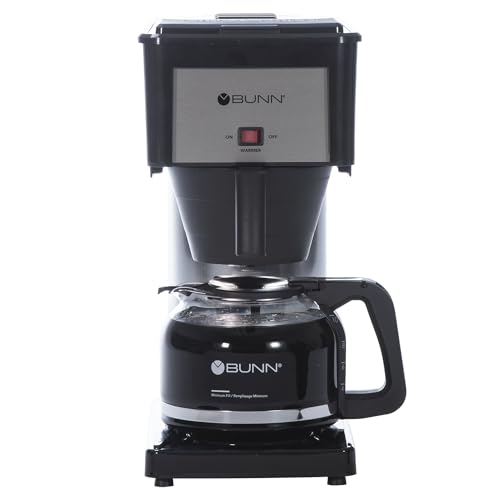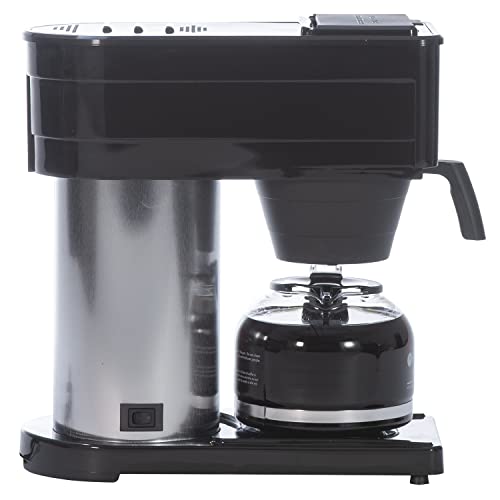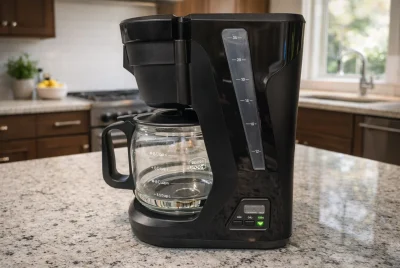Bunn Commercial Coffee Makers: Professional Guide
*We may earn a commission for purchases made using our links. Please see our disclosure to learn more.
The aroma of perfectly brewed coffee fills the air as the morning rush begins. Behind every successful café, restaurant, or office break room stands a reliable workhorse – the commercial coffee maker. In the world of professional coffee equipment, one name has consistently delivered exceptional performance for over six decades: Bunn.
The difference between a mediocre cup and an extraordinary one often lies in the equipment used. Commercial establishments understand that their coffee quality directly impacts customer satisfaction, employee productivity, and ultimately, their bottom line. This reality has made choosing the right commercial coffee maker a critical business decision that extends far beyond simple convenience.
“The secret to great coffee isn’t just in the beans – it’s in the consistency of brewing temperature, extraction time, and water distribution. That’s where professional equipment makes all the difference.”
– Coffee Industry Research Institute
Key Takeaways
Before diving deep into the world of Bunn commercial coffee makers, here are the essential points every business owner should know:
- Reliability Factor: Bunn commercial coffee makers are engineered for high-volume brewing with consistent temperature control and durability
- Brewing Capacity: Models range from 3.8 gallons per hour to over 17 gallons per hour, suitable for various business sizes
- Temperature Precision: Advanced heating systems maintain optimal brewing temperatures between 195-205°F consistently
- Maintenance Requirements: Regular descaling and cleaning protocols ensure longevity and consistent coffee quality
- Investment Value: Higher upfront costs are offset by reduced downtime, lower maintenance needs, and superior coffee quality
Top 4 Bunn Commercial Coffee Makers
1. BUNN VP17-1SS Pourover Coffee Brewer with 1-Warmer
The BUNN 13300.0001 VP17-1SS is a reliable, compact commercial coffee maker designed for high-volume brewing without the need for plumbing. With its stainless steel build and simple operation, it’s perfect for cafes, offices, or catering services. This model brews up to 3.8 gallons of rich, flavorful coffee per hour and includes a single warmer to keep your brew hot. Featuring a portable design and safety-focused SplashGard funnel, this BUNN brewer combines durability and convenience for professional use.
- Fast Brewing: Brews up to 3.8 gallons per hour—ideal for busy environments.
- No Plumbing Needed: Pourover design allows for easy placement anywhere.
- Durable Build: Stainless steel body ensures long-lasting performance.
- Single Warmer: Only includes one warmer—may not suit all high-volume needs.
- Manual Operation: Requires manual water refill, unlike plumbed-in systems.
- Basic Controls: Lacks programmable or digital features for advanced brewing.
When it comes to dependable brewing, BUNN commercial coffee makers consistently stand out—and the BUNN VP17-1SS Pourover Coffee Brewer proves why. Designed for cafes, offices, and catering setups, this model brews up to 3.8 gallons of coffee per hour without requiring a plumbing connection. Its stainless steel construction offers both durability and a professional look, while the compact size and single warmer make it easy to use in smaller spaces. If you’re looking for a portable, efficient coffee maker built for heavy use, the BUNN VP17-1SS is a strong contender in the commercial brewing world.
2. BUNN CWTF15-APS Commercial Airpot Coffee Brewer
The BUNN CWTF15-APS is a versatile and durable airpot coffee brewer designed for commercial use. With the ability to brew directly into 1.9 to 3L airpots (sold separately), this model is ideal for offices, conferences, or any high-traffic environment. It features both automatic plumbed operation and a backup pourover function for flexibility. Made with stainless steel and equipped with a hot water faucet, this brewer ensures convenient service and long-lasting performance.
- Dual Brewing Options: Offers both plumbed and manual pourover features for added flexibility.
- Thermal Serving: Compatible with airpots, perfect for keeping coffee hot and mobile.
- Hot Water Access: Built-in hot water faucet adds convenience for tea or instant beverages.
- Airpots Sold Separately: Doesn't include airpots, adding to the overall cost.
- High Price Point: More expensive than standard commercial brewers.
- Heavy Build: Weighs nearly 36 lbs—less portable than other models.
For businesses needing both volume and versatility, the BUNN CWTF15-APS stands out among BUNN commercial coffee makers. This airpot brewer supports automatic plumbed-in water lines while offering a backup pourover option, making it ideal for busy offices, hotels, and catering setups. Its stainless steel build is designed for heavy use, and it brews directly into 1.9–3L airpots, allowing hot coffee to be served away from the machine—perfect for meetings or breakfast bars. With a built-in hot water faucet and durable construction, the CWTF15-APS offers performance and practicality in one powerful machine.
3. Bunn Speed Brew Classic 10-Cup Coffee Maker
Brew café-quality coffee in minutes with the BUNN BX Speed Brew Classic. Designed with commercial-grade technology, this 10-cup drip coffee maker uses an internal stainless steel hot water tank to maintain optimal brewing temperature. With its fast 4-minute brew time and proprietary drip-free carafe, it’s built for coffee lovers who want speed, taste, and convenience. The sleek black and stainless-steel design adds a classic touch to any kitchen, while the multi-stream sprayhead ensures even flavor extraction.
- Ultra-Fast Brewing: Brews a full 10-cup carafe in just 4 minutes.
- Commercial-Grade Tank: Keeps 70 oz of water hot for quick brewing on demand.
- Drip-Free Carafe: Innovative spout design ensures clean, mess-free pours.
- Non-Programmable: Lacks timer or digital controls for scheduled brewing.
- Always-On Tank: Keeps water hot constantly, which may consume more energy.
- Manual Operation: Requires manual water pouring before brewing.
Though designed for home use, the BUNN BX Speed Brew Classic incorporates technology found in BUNN commercial coffee makers, offering fast and flavorful brewing in just 4 minutes. It uses a commercial-grade stainless steel tank to keep water hot at all times, ensuring coffee is ready when you are. Its signature multi-stream sprayhead evenly saturates coffee grounds for a rich, café-style taste. Ideal for households that value speed and quality, this model bridges the gap between commercial reliability and home convenience.
4. BUNN 33200 VPR 12-Cup Commercial Pourover Coffee Maker
The BUNN 33200 VPR is a dependable and efficient pourover coffee maker designed for commercial settings. With the ability to brew up to 12 cups (486 oz) of coffee, this unit is ideal for small offices, restaurants, and catering services. Its all-black design, stainless steel internals, and dual warmers make it a functional and space-saving solution. Since it requires no plumbing, the VPR offers flexible placement and easy setup, making it a go-to option for high-volume brewing without the hassle.
- No Plumbing Required: Simple pourover setup allows flexible placement anywhere.
- High Volume: Brews up to 12 cups—great for office or light commercial use.
- Dual Warmers: Keeps multiple carafes warm for continued serving.
- No Digital Controls: Lacks advanced features like timers or touch interface.
- Manual Refill: Requires water to be poured manually for each brew cycle.
- Basic Design: More functional than stylish—designed purely for performance.
Among BUNN commercial coffee makers, the BUNN 33200 VPR is a standout option for businesses needing simple, high-capacity brewing. Its pourover design eliminates the need for plumbing, making it a versatile choice for offices, events, and catering. With a 12-cup capacity, dual warming plates, and stainless steel construction, the VPR ensures you have hot, fresh coffee ready at all times. If you’re looking for a commercial-grade machine that’s easy to use and built for performance, the BUNN VPR is a solid investment.
The Evolution of Commercial Coffee Excellence
The journey into professional coffee brewing often begins with a simple realization: standard home coffee makers simply cannot meet the demands of commercial use. The transformation from basic brewing to professional-grade coffee service represents more than just an equipment upgrade – it’s a commitment to quality that customers and employees immediately notice.
Commercial coffee makers operate under entirely different principles than their residential counterparts. Where home machines might brew 4-12 cups occasionally, commercial units must consistently produce dozens of cups hourly while maintaining precise temperature control and extraction standards. This fundamental difference in operational demands explains why professional establishments invest in dedicated commercial equipment.
Understanding the Commercial Coffee Landscape
The commercial coffee market presents unique challenges that standard equipment cannot address. High-volume brewing requires machines that can handle continuous operation without degradation in quality. Temperature consistency becomes crucial when brewing multiple batches throughout the day, as even minor variations can significantly impact taste profiles.
Water quality considerations also become more complex in commercial settings. Hard water can quickly damage equipment and affect taste, while inconsistent water pressure can disrupt brewing cycles. Professional coffee makers incorporate advanced filtration systems and pressure regulation to address these challenges systematically.
Three Key Innovations That Transform Coffee Service
Advanced Heating Technology
Modern commercial coffee makers utilize sophisticated heating systems that maintain precise temperature control throughout the brewing process. Unlike simple heating elements found in home units, commercial systems employ multiple heating zones and thermal management systems that ensure optimal extraction temperatures consistently.
The brewing temperature window of 195-205°F represents the sweet spot for coffee extraction. Too low, and the coffee becomes weak and under-extracted. Too high, and bitter compounds dominate the flavor profile. Professional equipment maintains this narrow temperature range through advanced thermostatic controls and heat exchangers that respond quickly to temperature fluctuations.
This temperature precision directly impacts the sensory experience of coffee service. Customers immediately notice the difference between coffee brewed at optimal temperatures versus coffee from equipment with poor temperature control. The consistency of temperature control also ensures that the first cup of the day tastes identical to the last cup, maintaining quality standards throughout service hours.
High-Volume Brewing Systems
Commercial coffee makers employ brewing systems designed specifically for high-volume production. These systems incorporate features like multiple brew heads, large water reservoirs, and rapid heating recovery that enable continuous operation without quality compromise.
The brewing cycle in commercial equipment involves precise timing and water distribution patterns that ensure optimal extraction across large batches. Shower heads distribute water evenly across coffee grounds, preventing over-extraction in some areas while under-extracting in others. This uniform distribution creates consistent flavor profiles regardless of batch size.
Recovery time between brewing cycles becomes critical in commercial settings. Advanced heating systems can reheat water reservoirs quickly, enabling back-to-back brewing without temperature drops that would affect coffee quality. This rapid recovery capability allows businesses to meet peak demand periods without service delays.
Automated Quality Control
Modern commercial coffee makers incorporate automated systems that monitor and adjust brewing parameters continuously. These systems track water temperature, brew time, and extraction rates, making real-time adjustments to maintain consistency.
Programmable brewing cycles allow operators to customize extraction parameters for different coffee types and roast levels. This flexibility enables establishments to serve various coffee styles without compromising quality standards. The automation also reduces the skill level required for consistent results, making quality coffee service more accessible to staff.
Self-diagnostic capabilities in advanced units alert operators to maintenance needs before they affect coffee quality. These systems monitor component performance and provide maintenance schedules that prevent unexpected breakdowns during peak service periods.
Overcoming Common Commercial Coffee Challenges
Managing Peak Demand Periods
Commercial establishments face intense pressure during peak hours when coffee demand can overwhelm standard equipment. The morning rush in offices, breakfast service in restaurants, and afternoon breaks in conference centers all create periods where coffee production must scale rapidly without quality degradation.
High-capacity commercial coffee makers address this challenge through features like multiple brewing stations, large water reservoirs, and rapid heating systems. These capabilities allow continuous brewing cycles that can meet surge demand while maintaining temperature and extraction standards.
Scheduling brewing cycles to anticipate demand patterns becomes crucial for maintaining service quality. Commercial equipment often includes programmable timers that can initiate brewing cycles automatically, ensuring fresh coffee is ready when customers arrive.
Maintaining Consistency Across Shifts
Different operators and varying service conditions throughout the day can create inconsistencies in coffee quality. Commercial equipment addresses this challenge through automated brewing systems that reduce variables that could affect final product quality.
Training requirements for commercial coffee equipment focus on maintenance procedures and quality monitoring rather than brewing techniques. This standardization ensures that coffee quality remains consistent regardless of who operates the equipment or when service occurs.
Documentation of brewing parameters and maintenance schedules helps maintain consistency across different shifts and operators. Commercial establishments often develop standard operating procedures that specify exact settings and procedures for their specific equipment and coffee types.
Controlling Operating Costs
Commercial coffee service involves significant ongoing costs including coffee supplies, energy consumption, water usage, and maintenance expenses. Efficient equipment can substantially reduce these operational costs while improving service quality.
Energy-efficient heating systems reduce electrical consumption while maintaining performance standards. Insulated brewing systems retain heat more effectively, reducing the energy required to maintain optimal brewing temperatures throughout the day.
Water filtration systems protect equipment from mineral buildup that can cause expensive repairs and reduce equipment lifespan. Regular maintenance schedules prevent minor issues from developing into major problems that could require equipment replacement.
The Broader Impact of Professional Coffee Service
Workplace Productivity and Satisfaction
Quality coffee service significantly impacts workplace productivity and employee satisfaction. Studies consistently show that employees who have access to good coffee report higher job satisfaction and increased productivity throughout the day.
The social aspect of coffee service also contributes to workplace culture. Coffee breaks provide opportunities for informal communication and team building that can improve overall workplace dynamics. Quality coffee service demonstrates organizational commitment to employee welfare and attention to detail.
Cost savings from providing quality coffee service on-site can be substantial when compared to employees purchasing coffee from external vendors. The convenience factor also reduces time away from work, contributing to overall productivity improvements.
Customer Experience and Brand Perception
For customer-facing businesses, coffee quality directly impacts brand perception and customer loyalty. Customers often judge establishments based on their coffee quality, using it as an indicator of overall attention to detail and quality standards.
Consistent coffee quality builds customer trust and encourages repeat visits. Customers develop expectations based on previous experiences, and meeting those expectations consistently requires reliable equipment that performs uniformly over time.
The speed of service also affects customer satisfaction. Commercial coffee makers that can produce quality coffee quickly help reduce wait times and improve overall service efficiency, particularly during peak periods.
Environmental Considerations
Commercial coffee service involves environmental considerations including energy consumption, waste production, and water usage. Efficient equipment can significantly reduce the environmental impact of coffee service while maintaining quality standards.
Energy-efficient brewing systems reduce electrical consumption and associated carbon emissions. Proper equipment sizing ensures that energy consumption matches actual demand rather than over-capacity that wastes resources.
Waste reduction through proper brewing techniques and equipment maintenance also contributes to environmental sustainability. Consistent brewing reduces the amount of coffee that must be discarded due to quality issues, minimizing waste production.
Practical Implementation Strategies
Assessing Your Coffee Service Needs
Determining appropriate equipment capacity requires careful analysis of actual demand patterns rather than estimated needs. Tracking coffee consumption over several weeks provides data needed to select equipment that matches real usage without over-investing in unnecessary capacity.
Peak demand periods require special consideration when selecting commercial coffee makers. Equipment must handle surge capacity during busy periods while operating efficiently during slower times. This balance between capacity and efficiency affects both initial investment and ongoing operational costs.
Future growth projections should influence equipment selection to avoid premature obsolescence. Investing in equipment that can accommodate reasonable growth expectations prevents the need for costly upgrades in the near term.
Installation and Setup Considerations
Commercial coffee makers require proper installation to achieve optimal performance and reliability. Electrical requirements, water connections, and ventilation needs must be addressed during installation to prevent operational issues.
Water quality testing should precede equipment installation to determine filtration needs and identify potential problems that could affect equipment performance. Poor water quality can damage equipment and affect coffee taste, making proper water treatment essential.
Staff training requirements vary depending on equipment complexity and operational procedures. Comprehensive training programs ensure that all operators understand proper procedures and maintenance requirements that keep equipment functioning optimally.
Developing Maintenance Protocols
Regular maintenance schedules prevent minor issues from developing into major problems that could disrupt service or require expensive repairs. Commercial equipment manufacturers provide specific maintenance guidelines that should be followed consistently.
Cleaning procedures for commercial coffee makers involve more than basic rinsing. Proper cleaning removes oil buildup and mineral deposits that can affect taste and equipment performance. Daily, weekly, and monthly cleaning schedules ensure equipment maintains optimal performance.
Replacement part availability and service support should be considered when selecting commercial coffee equipment. Established manufacturers typically provide better parts availability and technical support, reducing downtime when maintenance is required.
Celebrating Success in Coffee Service
Measuring Quality Improvements
Implementing commercial coffee equipment often produces measurable improvements in service quality and efficiency. Customer feedback, employee satisfaction surveys, and operational metrics can demonstrate the value of investing in professional equipment.
Cost analysis comparing previous coffee service expenses with new operational costs often reveals significant savings. These savings come from reduced waste, improved efficiency, and decreased maintenance requirements compared to inadequate equipment.
Service speed improvements can be measured through timing studies that compare service delivery before and after equipment upgrades. Faster service often translates to improved customer satisfaction and increased revenue potential.
Building Coffee Culture
Quality coffee service can become a focal point for building positive workplace culture or enhancing customer experience. The investment in professional equipment demonstrates commitment to quality that extends beyond just coffee service.
Training staff on proper coffee service procedures creates opportunities for skill development and job satisfaction. Employees often take pride in providing quality service when they have proper tools and training.
Recognition programs that celebrate coffee service excellence can reinforce quality standards and encourage continued attention to detail. These programs help maintain high standards over time and prevent quality degradation.
Future Considerations and Continuous Improvement
The commercial coffee industry continues evolving with new technologies and changing customer expectations. Staying informed about industry trends and equipment developments helps maintain competitive advantages and service quality.
Technology integration in commercial coffee equipment increasingly includes features like remote monitoring, automated maintenance alerts, and programmable brewing profiles. These advances can improve efficiency and reduce operational complexity.
Sustainability considerations in commercial coffee service continue growing in importance. Equipment that reduces energy consumption, minimizes waste, and supports sustainable practices becomes increasingly valuable from both cost and environmental perspectives.
Conclusion
The journey toward exceptional commercial coffee service represents more than just an equipment purchase – it’s an investment in quality, consistency, and customer satisfaction. Professional coffee makers transform the entire coffee service experience, creating opportunities for improved productivity, enhanced customer relationships, and operational efficiency.
The challenges of commercial coffee service – from peak demand management to consistency maintenance – require equipment designed specifically for professional use. Standard solutions simply cannot meet the demands of commercial environments where quality and reliability are essential.
Success in commercial coffee service comes from understanding that every element matters: equipment selection, installation, training, maintenance, and continuous improvement. When these elements work together effectively, the result is coffee service that enhances rather than compromises the overall business operation.
The investment in quality commercial coffee equipment pays dividends through reduced operational costs, improved customer satisfaction, and enhanced workplace culture. These benefits extend far beyond the immediate coffee service, contributing to overall business success and competitive advantage.
For businesses considering the transition to professional coffee service, the key lies in understanding specific needs, selecting appropriate equipment, and committing to the operational procedures that ensure consistent quality. The reward for this commitment is coffee service that truly makes a difference in daily operations and customer experience.
Frequently Asked Questions
Q: How much coffee can a commercial Bunn coffee maker produce per hour?
A: Bunn commercial coffee makers range from 3.8 gallons per hour for smaller units to over 17 gallons per hour for high-capacity models. The specific capacity depends on the model selected and is designed to match different business volume requirements.
Q: What maintenance is required for Bunn commercial coffee makers?
A: Regular maintenance includes daily cleaning of brew baskets and carafes, weekly descaling depending on water hardness, monthly deep cleaning of internal components, and quarterly replacement of water filters. Following manufacturer maintenance schedules extends equipment life and maintains coffee quality.
Q: Do Bunn commercial coffee makers require special electrical connections?
A: Most Bunn commercial coffee makers operate on standard 120V electrical connections, though some high-capacity models may require 240V connections. Always verify electrical requirements before installation and ensure proper grounding for safety and optimal performance.
Q: How long does it take to brew coffee with a Bunn commercial coffee maker?
A: Bunn commercial coffee makers typically brew a full batch in 3-6 minutes, depending on the model and batch size. The internal hot water tank maintains optimal brewing temperature continuously, eliminating warm-up time between brewing cycles.
Q: Are Bunn commercial coffee makers suitable for small businesses?
A: Yes, Bunn offers commercial coffee makers designed specifically for small businesses, including compact models that produce 3.8 gallons per hour. These units provide commercial-grade quality and reliability while being appropriately sized for smaller operations and budgets.

